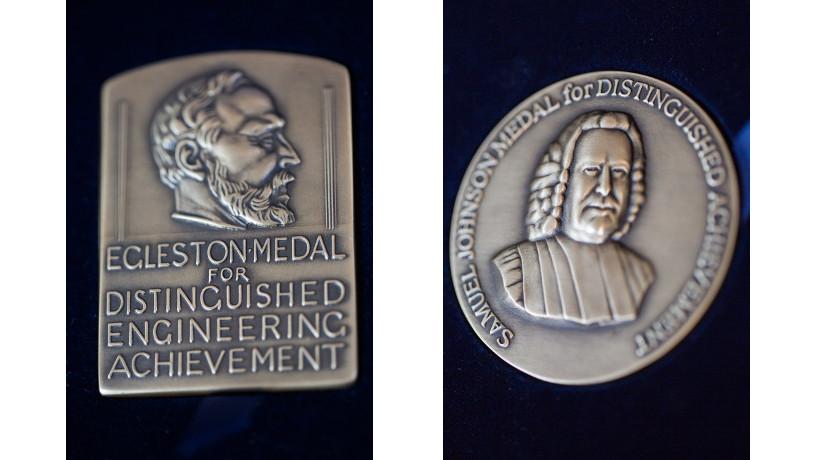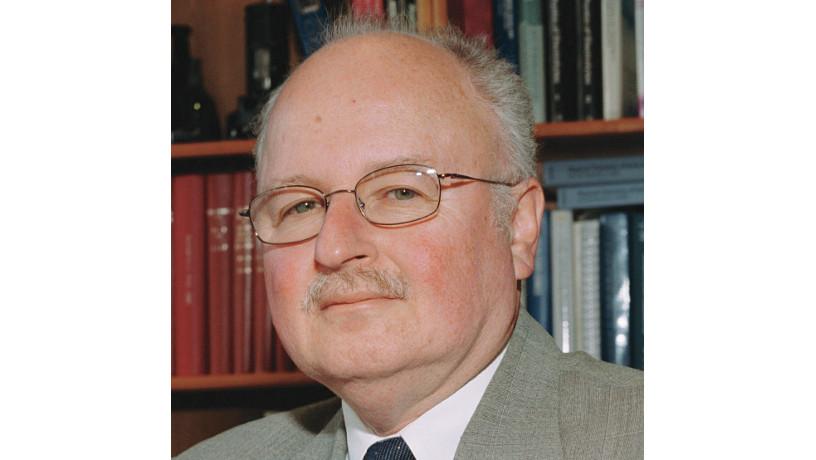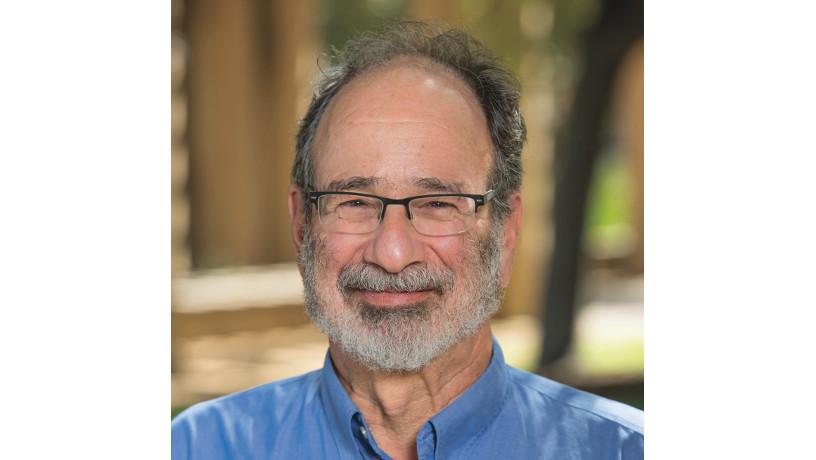Alumni Medalists

The Thomas Egleston Medal and the Samuel Johnson Medal.
To celebrate some of the talented and industrious pioneers behind today’s innovations, the Columbia Engineering Alumni Association presents two prestigious awards each Reunion Weekend to science and engineering superstars affiliated with the University: the Thomas Egleston Medal and the Samuel Johnson Medal. These are the 2019 winners.
Harry L. Tuller
In recognition of his contributions to the field of electronic materials, Harry L. Tuller is this year’s recipient of the Thomas Egleston Medal, which honors distinguished achievement in engineering or applied science.
Tuller’s research focuses on defects, diffusion, and the electrical, electrochemical, and optical properties of metal oxides. His work has important applications to sensors, energy conversion (fuel cells, solar water splitting), computer memories, and MEMS devices. For example, Tuller has aided the development of automotive emissions monitoring as well as miniaturized sensor technology for health diagnostics via noninvasive breath monitoring for detecting diseases such as tuberculosis and diabetes.
In 1962, Tuller matriculated at Columbia Engineering and went on to receive his BS and MS in electrical engineering as well as his EngScD in solid state science and engineering. After completing his postdoctoral work in physics at the Technion – Israel Institute of Technology, Tuller joined the faculty at MIT, where he continues his research as the R. P. Simmons Professor of Ceramics and Electronic Materials and head of the Crystal Physics and Electroceramics Laboratory.
During his illustrious career in academia, Tuller has published over 480 articles, coedited 15 books, and earned 34 patents. He is also editor-in-chief of the Journal of Electroceramics; series editor of Electronic Materials: Science and Technology; and cofounder of Boston MicroSystems, a pioneer in silicon carbide-based MEMS technology and devices. Tuller’s groundbreaking work in his field has earned him numerous accolades, which most recently include being elected president of the International Society of Solid State Ionics (2015–17), named fellow of the Electrochemical Society (2014), and awarded distinguished life membership in the American Ceramic Society (2016). Additionally, Tuller was promoted to senior member of the Institute of Electrical and Electronics Engineers, an honor achieved by only 9 percent of its members.
In addition to his scholarship, Tuller has been a dedicated adviser and mentor, helping to shape students’ research and support their academic well-being. He was recently recognized by Committed to Caring, MIT’s organization for honoring professors “who build inclusive cultures in their labs and classrooms, who support their students’ mental and emotional health, and who actively support their students’ scholarly pursuits.”

Alvin E. Roth
The Samuel Johnson Medal is awarded to an alumnus of distinguished achievement outside the realm of traditional engineering or applied science. Nobel Laureate Alvin E. Roth is receiving this medal in recognition of his pioneering contributions to game theory, experimental economics, and market design.
Roth is a leader in a growing field of “matching markets”—research that expands the traditional definition of marketplace buyers and sellers to a host of real-world exchanges premised on noncommodity trades. With diverse applications from public school admissions to life-saving organ donation programs, Roth strives to understand these markets at both a theoretical and practical level to help make them more efficient and equitable. His pioneering work in this area earned him the 2012 Nobel Prize in Economics, alongside American economist Lloyd Shapley.
An operations research scientist by study, Roth grew up in the borough of Queens, but never completed high school before matriculating at Columbia University. Despite this nonlinear path, Roth excelled at the University, graduating from Columbia Engineering in 1971 and then completing his master's and doctorate at Stanford in 1973 and 1974. From there he went on to teach at the University of Illinois and the University of Pittsburgh; he currently serves as both the George Gund Professor of Economics and Business Administration Emeritus at Harvard and the Craig and Susan McCaw Professor of Economics at Stanford, where he has taught since 2013.
Lauded for his ability to bring practical solutions to complex problems, Roth was one of the founders and designers of kidney exchange protocol in the US; and the high school matching system used in New York City—which has been demonstrated to increase student welfare and has since been replicated in five other US cities, including Denver and Washington DC. He also helped redesign the National Resident Matching Program, which places medical students in residency training programs. Author of Who Gets What and parent of a 2006 Columbia College graduate, Roth resides in Palo Alto with his wife, Emilie Roth.

